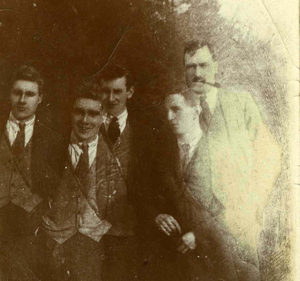FRANK AIKEN GIVES THE ORDER TO DUMP ARMS
Published in Issue 3 (May/June 2023), Volume 31By Joseph E.A. Connell Jr

Above: Frank Aiken (with pipe) during the War of Independence. After Liam Lynch’s death on 10 April 1923, Aiken, as the new IRA chief-of-staff, issued orders to cease offensive operations from noon on 30 April and on 24 May to dump arms. (UCD Archives)
Although Liam Lynch opposed the seizure of the Four Courts in April 1922 by a group of hard-line republicans, he joined its garrison in June 1922. He was arrested by the Free State forces but was allowed to leave Dublin, on the understanding that he would try and halt the fighting. Instead, he quickly began organising resistance elsewhere.
With the capture of Joe McKelvey at the Four Courts, Lynch again assumed the role of O/C of the IRA. Lynch, who was most familiar with the south, planned to establish the ‘Munster Republic’, which he believed would frustrate the creation of the Free State. Consequently, he established his HQ at Limerick in order to defend the ‘Munster Republic’ behind the ‘Limerick–Waterford Line’. It fell to Free State troops on 20 July 1922, and Lynch retreated further south.
On 10 April 1923 a Free State unit was seen approaching Lynch’s secret headquarters in the Knockmealdown Mountains. Lynch was carrying important papers that he knew must not fall into enemy hands, so he and his six comrades began a strategic retreat. They ran into another unit of 50 soldiers approaching from the opposite side. Lynch was hit by rifle fire from the road at the foot of the hill. Knowing the value of the papers they carried, he ordered his men to take the papers and leave him behind. When the soldiers finally reached Lynch, they initially believed him to be Eamon de Valera, but he informed them: ‘I am Liam Lynch, chief-of-staff of the Irish Republican Army. Get me a priest and doctor, I’m dying.’
The Irish Civil War came to an end after Lynch’s death. On 27 April the IRA received an order issued by Frank Aiken, their new chief-of-staff, announcing the suspension of all offensive operations from noon on 30 April. Shortly afterwards, on 24 May 1923, Aiken issued an order to the IRA to ‘dump arms’. Eamon de Valera issued a supporting statement:
‘Soldiers of the Republic, Legion of the Rearguard … The Republic can no longer be defended successfully by your arms … Further sacrifice of life would now be vain and continuance of the struggle in arms unwise in the national interest and prejudicial to the future of our cause. Military victory must be allowed to rest for the moment with those who have destroyed the Republic. Other means must be sought to safeguard the nation’s right … Much that you set out to accomplish has been achieved. You have saved the nation’s honour and kept open the road to independence. You have demonstrated in a way there is no mistaking that we are not a nation of willing bondslaves. The sufferings you must now face unarmed you will bear in a manner worthy of men who are willing to give their lives for a cause. The thought that you still have to suffer for your devotion will lighten your present sorrow, and what you endure will keep you in communion with your dead comrades, who gave their lives and all those lives promised, for Ireland. May God guard every one of you and give to our country in times of need sons who will love her as dearly and devotedly as you. Seven years of intense effort have exhausted our people. Their sacrifices and their sorrows have been many. If they have turned aside and have not given you that active support which alone could have brought you victory in this last year, it is because they saw overwhelming forces against them and they are weary and need a rest … A little time and you will see them recover and rally again to the standard … When they are ready, you will be, and your place will be again as of old with the vanguard.’
Although the fighting ceased, peace did not really return. Distrust, bitterness and hatreds festered for years to come.
Joseph E.A. Connell Jr is the author of The Terror War: the uncomfortable realities of the Irish War of Independence (Eastwood Books).
















